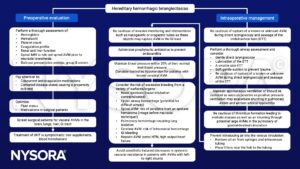Learning objectives
- Signs and symptoms, complications and management of hereditary hemorrhagic telangiectasias (HHT)
Definition and mechanisms
- Hereditary hemorrhagic telangiectasias HHT causes abnormal connections, called arteriovenous malformations (AVMs), to develop between arteries and veins
- The most common locations affected are the nose, lungs, brain, and liver
- These AVMs may enlarge over time and are more prone to hemorrhage
- Telangiectasias refers to malformations of small vessels and can be described as dilated arterioles in communication with dilated post-capillary venules
- HHT is an autosomal dominant genetic disorder and is also known as Osler-Weber-Rendu disease
Signs and symptoms
- Nosebleeds, sometimes daily and often starting in childhood
- Abnormal blood vessels (telangiectasia) may appear just underneath the skin, which show as red or purple spots
- Red or purple spots usually form on the fingertip pads, the lips, and the lining of the nose or the gut
- Iron deficiency anemia
- Shortness of breath
- Headaches
- Seizures
- Abnormal artery-vein connections within the brain, lungs, and liver
- Iron deficiency anemia
Complications
Diagnosis
The diagnosis can be made depending on the presence of four criteria, known as the “Curaçao criteria”:
- Spontaneous recurrent epistaxis
- Multiple telangiectasias in typical locations
- Proven visceral AVM (lung, liver, brain, spine)
- First-degree family member with HHT
Management

Suggested reading
- Robinson, D., Rogers, B., Kapoor, R., Swan, J., Speas, G., Gutmann, R., 2014. Anesthetic Considerations for a Patient With Hereditary Hemorrhagic Telangiectasia (Osler–Weber–Rendu Syndrome) Undergoing a Five-Box Thoracoscopic Maze Procedure for Atrial Fibrillation. Journal of Investigative Medicine High Impact Case Reports 2, 232470961455366.
We would love to hear from you. If you should detect any errors, email us customerservice@nysora.com